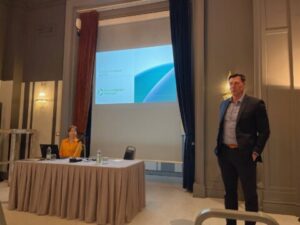


nella foto Amie Lauder & Nicole Loghin di Peterson Capital e Jesse Douglas CEO di Green Impact Partners che presenta l’evento al Sheraton Diana majestic
Our view: We are upgrading the shares of GIP to Outperform, Speculative Risk (from Sector Perform) and increasing our PT to $14 (from $10), because we see significant upside potential if management successfully procures its Calgary Future Energy Park development. If the project is executed in line with management’s guidance, we estimate that the company can create ~$35/share of value over the next 2-3 years.
Key points:
Potential $35/share of value creation from the Calgary development alone. If management successfully develops its Calgary ethanol and RNG project (Future Energy Park or FEP), we estimate that GIP could create over $700 million ($35/share) of value (in excess of project costs).
When the project was initially announced in June 2021, management indicated that they would look to sell down a minority stake to fund its equity investment in the project. Using the low end of management’s EBITDA forecast and a pre-tax equity discount rate of 12%, we estimate that GIP could potentially divest a 49% interest for ~$345 million (7x EBITDA valuation). The proceeds
would be used to fund GIP’s 51% equity investment ($184 million), and leaves GIP with $161 million ($8/share) of cash that can be used to fund other developments. Please refer to page 3 for additional details.
FEP tracking towardsfinancial close by year-end. It has been eight months since GIP announced the FEP project, and management has increased the size and scale of the project, and advanced the development. FEP is a large- scale biofuel facility utilizing primarily non-food-grade wheat to produce annually over 300 million litres of ethanol, 3.5 million MMBTu of RNG, and
1.5 million tonnes of carbon-offset credits.
Management expects the total project cost to be $900 million (including $150 million in contingencies), and generate ~$230-250 million in annual EBITDA, reflecting a ~3.75x build
multiple. Management expects ~$180 million (75%) of the total EBITDA will be contracted, which relates to RNG sales and carbon offtake credits.
The development is in the permitting and public consultation stage, and management is working towards financial close and a construction start date by the end of 2022, with completion by the end of 2024.
Increasing our price target to $14 (from $10). Our price target is based on a sum-of-the parts analysis, where we allocate ~$2.00/share for the operating business that consists of water-processing and solids recycling and overhead (6x our 2023E EBITDA), $5.50/share (net of debt) for the Colorado RNG project under construction (~8.5x run-rate EBITDA), and $6.50/share for the Future Energy Park (pre-tax 12% equity discount rate, and a 20% probability ofsuccess). We have allocated no value for the other developments, including the Iowa RNG project(potential construction start date later this year).
RBC Dominion Securities Inc.
Nelson Ng, CFA (Analyst)
(604) 257-7617, [email protected]
Trevor Bryan, CFA (Senior Associate)
(604) 257-7383, [email protected]
Outperform (prev: Sector Perform)
Speculative Risk (prev: Not Assigned)
TSXV: GIP; CAD 7.90
Price Target CAD 14.00 ↑ 10.00
WHAT’S INSIDE
☑ Rating/Risk Change ☑ Price Target Change
☐ In-Depth Report ☐ Est. Change
☐ Preview ☐ News Analysis
Scenario Analysis*
Downside
Scenario
3.00
62%
Current
Price
7.90
Price
Target
14.00
77%
Upside
Scenario
21.00
166%
*Implied Total Returns
Key Statistics
Shares O/S (MM): 20.3
Dividend: 0.00
Market Cap (MM): 160
Yield: 0.0%
Enterprise Val. (MM): 162
Avg. Daily Volume: 14,276
RBC Estimates
FY Dec 2020A 2021E 2022E 2023E
EBITDA, Adj 3.2 3.4 6.3 19.4
EV/EBITDA NM 22.9x 7.0x
FFO/Sh, Ops
Diluted
0.16 0.16 0.28 0.79
P/FFO 49.4x 49.4x 28.2x 10.0x
ACFFO/Sh
Diluted
NA 0.11 0.23 0.67
P/ACFFO NM 71.8x 34.3x 11.8x
EPS, Adj Diluted (0.12) (0.20) (0.08) 0.15
P/AEPS NM NM NM 52.7x
EBITDA, Adj Q1 Q2 Q3 Q4
2021 1.3A 0.2A 0.6A 1.3E
Management, the Board, and insiders directly and indirectly own 31% of the shares outstanding, of which the CEO owns 12%.
All values in CAD unless otherwise noted.
Priced as of prior trading day’s market close, EST (unless otherwise noted).
Disseminated: Mar 1, 2022 03:55EST; Produced: Mar 1, 2022 03:55EST
Green Impact Partners Inc.
Significant value-creation potential from Calgary Development
In June 2021, GIP announced the partnership with Carbon Clean Energy and PCL Constructors to develop a large-scale biofuel facility near Calgary utilizing primarily wheat to produce ethanol
and RNG, and also generate carbon-offset credits. At the time, the anticipated project cost was $475 million, which would generate $140 million of annual EBITDA. Management anticipated
holding a 50% interest in the project.
Over the past eight months since GIP announced the project (Future Energy Park or FEP), management has increased the size and scale of the project, and advanced the development.
After refining the plans, FEP will utilize primarily non-food-grade wheat to mainly produce annually over 300 million litres of ethanol, 3.5 million MMBTu of RNG, and 1.5 million tonnes of
carbon-offset credits. Management expects the total project cost to be $900 million (including $150 million in contingencies), generating ~$230-250 million in annual EBITDA, reflecting
a ~3.75x build multiple. Management expects ~$180 million (75%) of total EBITDA will be contracted, which relate to RNG sales and carbon offtake credits.
The project is currently in the permitting process, which includes public consultation.
Management has indicated that there is strong local and provincial government support for the project. Management is working towards a financial close and construction start date by the end
of 2022, with completion by the end of 2024.
Construction cost
PCL is the project’s EPC contractor, and management indicated that they are using an open book process,so the costs and constructionmargins will be transparent. PCL has constructed a number
of RNG facilities, and will fully wrap (take the risk on) the varioustechnologiesthat will be utilized at the FEP development. Based on discussions with management on the breakdown of their
$900 million project cost estimate, the large components include roughly 40% for equipment costs, 15% for the EPC contractor costs (includes EPC overhead, risk and profit), and 15% for
financial and soft costs (e.g., insurance, property taxes, debt service reserve, and financial and legal costs).
Another 10% is for land, permitting and infrastructure, and the remaining 20% is for commissioning, startup and contingency.
Manufacturing Process
The primary feedstock for the FEP development is non-food grade wheat, and management indicated that the facility would use less than 20% of the excess supply of wheat in the region
that would otherwise be discarded. The wheat would go through a fermentation and distillation process to produce ethanol. The remaining solids (distillers grain) are transferred to digesters to
further break down the grain and produce RNG. Finally, the digested grain can be sold assoil and fertilizer. The CO2 generated by the process will be captured, transported and stored (injected
into wells). In addition, the manufacturing process will require the construction of a combined heat and power facility, which will generate excess power that can be sold into the grid.
Contracted profile
With respect to the project cost estimate, the cost of equipment and the EPC contractor would be fixed, locking in the majority of the project costs. Management highlighted that $150 million
of contingencies are included in the $900 million cost estimate. With respect to feedstock, management indicated that they will have long-term contracts with several large creditworthy
suppliers in addition to a number of small suppliers for a minimum period of 10 years. They plan to lock in the availability of twice the amount of feedstock required, and the feedstock price
is based on a discount to food-grade wheat. On a shorter-term basis (1-2 years), management plans to hedge food-grade wheat and ethanol prices to reduce margin volatility.
March 1, 2022 Nelson Ng, CFA (604) 257-7617; [email protected] 2
Green Impact Partners Inc.
On the production side, management expects to sign a 20-year contract for the RNG, and also plans to sell the CO2 offset credits under long-term (~10 years) contracts. The ethanol, excess
electricity production, and soil/fertilizer will be subject to market prices.
Financing
Management is progressing on its financing plan, and based on discussions with management, we estimate that 60% of the project cost can be financed with project-level non-recourse
debt (2.25x EBITDA). As a result, we estimate that project equity of $360 million is required.
Management indicated last year that they plan to own a 50% interest in the project (i.e., sell down ~50%), and based on our analysis, we believe that GIP can divest a 49% stake in the project
for ~$345 million. The proceeds would fund GIP’s 51% equity investment ($184 million), and leaves GIP with $161 million (~$8/share) in cash.
We note that GIP has applied to several renewable fuel subsidy programs, which could improve the project economics.
Future Energy Park valuation analysis
Based on discussions with management and the information provided in the company’s latest investor presentation, we have undertaken a more detailed analysis of the project based on the
following assumptions:
• Project cost: $900 million over two years (includes $150 million of contingencies).
• EBITDA: $230 million (low end of management’s $230-250 million guidance range) over 25
years, with no inflation escalation.
• Debt: 60% of project costs($540 million) with an interest rate of 6.0%, amortizing over 5 years.
We assume that the project raises non-recourse debt again in Year 10 on the same terms.
• Maintenance capex: $9 million per year (1% of project cost).
• Discount rate: Pre-tax equity discount rate of 12%
We estimate that the assumptions listed above result in pre-tax project IRR and levered equity IRR of 22%, and 28%, respectively. If the project is re-rated at a 12% pre-tax levered equity
discount rate, the project would realize $700 million of value creation (premium over project cost), which translatesto a value of ~7x EBITDA. We have also run some sensitivities below, which
highlight that project returns remain robust under various scenarios.
care of the redaction
